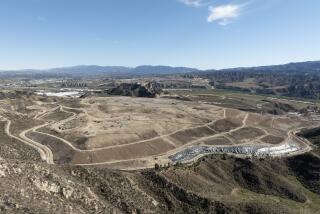School Staffers Blame Landfill for Cancers
- Share via
Teachers, counselors and former students at Francis Polytechnic High School in Sun Valley gave emotional testimony Monday about cancer among colleagues that the speakers blame, at least in part, on toxic gases from a now-closed landfill across from the campus.
Several school administrators told the state Senate Natural Resources Committee that they have counted 38 cases of cancer among past and current faculty.
However, Edwin Lowry, the director of the state Department of Toxic Substances Control, said Poly was among four sites recently tested and determined to be safe. Angelo Bellomo, a member of the Los Angeles Unified School District environmental team, testified that the district has found no connection between the health problems at the school and the Sheldon-Arleta Landfill, which closed in the late 1980s.
Sen. Tom Hayden (D-Los Angeles), committee chairman, said the panel is trying to determine if legislation is needed requiring more monitoring near landfills.
“This is a fact-finding investigative hearing,” Hayden told the crowd of about 100 in the Department of Water and Power building across the street from the high school.
The panel will hold another hearing within weeks in Carson, where Towne Avenue Elementary School has reported a similar high incidence of cancer cases.
Deborah Weaver, a teacher at Towne Avenue, testified that faculty and administrators believe that toxins from the landfill are responsible for a range of health problems, from kidney disorders and asthma to eight cancer cases.
“The high rate of cancer has distressed our staff,” Weaver said. “In the 1990s, every year someone got cancer at our school.”
Bellomo, whose team monitors efforts to identify potential toxins at more than 50 schools, said it will not be easy to make a connection between cancer and gases emanating from landfills.
“Because of the prevalence of cancer in our society, it will be difficult to detect cases induced by toxic components from things like landfills,” he said. “The cancer population is so large, a few extra cases from chemical exposure will be difficult to identify.”
He added, however, that “it should in no way alter the school district’s commitment to ensure the exposures are minimized by assuring that landfills are regulated and strictly monitored.”
But for many speakers Monday, the attention now being paid to an issue they say is nearly 20 years old is a case of too little, too late.
“Over the years, you could smell the odors from the landfill,” said Dean of Students Jerry Cord, a teacher and coach at the school for 33 years. “I was always told the toxins were not a problem, and methane [gas] was not a problem. But in the 1980s a baseball player got bone marrow cancer and died,” Cord said. “Several years later I got Hodgkin’s disease, and about a month ago a boy that played baseball for me in the ‘70s was diagnosed with Hodgkin’s.”
Cord and Sylvia Brown, a longtime counselor at Francis Poly, both said 38 cases of cancer at the school are known.
Anita Rubenstein, who grew up in a house across the street from the school, said she believes that toxins contributed to the death of her father. She provided a list of 20 people within a two-block area who have died from or been diagnosed with cancer.
“People are really concerned,” Rubenstein said in tears.
Former student Cathleen Granger also cried as she testified that her 38-year-old sister, an alumna of Poly, died of breast cancer that the family believes was connected to landfill toxins.
“There is no history of cancer in my family,” Granger said. “I remember when we were in school, the smell from the landfill was enough to make you gag.”
More to Read
Sign up for Essential California
The most important California stories and recommendations in your inbox every morning.
You may occasionally receive promotional content from the Los Angeles Times.










